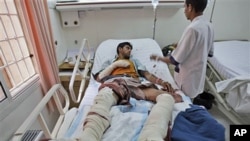Heavy fighting in Yemen's capital between government troops and forces loyal to a powerful tribal chief mark an escalating shift in the unrest roiling the country for nearly four months.
Plumes of smoke rose from the street battles in Sanaa, as President Ali Abdallah Saleh's troops fought members of Sheikh Sadeq al-Ahmar's Hashid tribe for a third day.
Dozens of people have been killed in the fighting that followed Saleh's rejection Sunday of a deal to step down.
The block-by-block clashes bring a new element to the unrest: The president Wednesday blamed Hashid tribesmen of provocative acts that are dragging Yemen into a civil war.
Speaking to reporters in Sana'a, Saleh said troops loyal to al-Ahmar, whose tribe is among the country's most influential, are trying to occupy key government ministries.
Witnesses in the capital report some offices already were under Hashid control. The Secretary General of the Gulf Cooperation Council, which brokered the transition deal, appealed to all sides for calm.
Abdullatif Al Zayani late Tuesday urged a peaceful solution to the impasse, as well as an immediate end to the fighting. The GCC has suspended mediation, but al-Zayani expressed hope it could be revived, adding the Gulf initiative is the only peaceful solution now available.
Saleh's rejection Sunday was the third time he backed out of a pact aimed at ensuring a transition to a more democratic state.
In London on Wednesday, U.S. President Barack Obama, in a news conference with British Prime Minister David Cameron, urged Saleh "to move immediately on his commitment to transfer power."
There are indications more tribes may be willing to join the Hashids in siding with Yemen's anti-government movement, one inspired by the popular political uprisings in Egypt and Tunisia.
And in the view of Yemeni political analyst Hakim al Masmari, the increase of the tribal element may be something Saleh might not mind.
"Showing people that Yemen will enter a crisis the more tribes are entering the capital, the more of a chance that Saleh remains in power to show the world that the crisis will continue and a civil war will happen and that, if he goes, Yemen will not be safe," said Masmari.
Pointing to the threat of tribal unrest is the latest of warnings from Saleh, as protests to his 30-year rule have increased. He has said that without his leadership, al Qaida in the Arabian Peninsula, the local terror offshoot, could gain ground - an alarming prospect for Yemen's ally, the United States.
And he has suggested that Shi'ite Iran could press its cause in the country - a major concern to the Sunni leaders of Saudi Arabia, another key backer.
Political analyst Masmari also is worried that the recent clashes are already adding to Yemen's instability.
"President Saleh's forces attacked the Ahmar family, so what we see now is that family is defending themselves more than attacking, however, they have gone over the limits," he said. "They are defending themselves, but also occupying government offices and headquarters."
It's just such fighting that prompted the U.S. embassy to close its doors until at least Thursday. Masmari said the dire situation might push the protesters, and foreign nations, to more action.
"The protesters' options are, number one: They are weighing the option of marching to the president palace to force him out of power," said Masmari. "And number two, they are counting on the international community to put more pressure on Saleh to leave power seriously, without the bloodshed of the Yemeni people."
Masmari argues that international mediators could apply much more direct pressure on the president - the questions is, do they want to.
Yemen Troops Fight Tribal Forces, New Turn in Revolt




